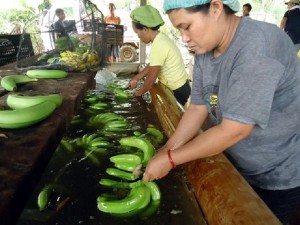DAVAO CITY—Iran, which is on the list of nations sanctioned by the United Nations’ Security Council, is among the new markets that the Department of Agriculture (DA) has targeted for Philippine bananas, Agriculture Assistant Secretary Salvador Salacop said here on Thursday.
In including Iran as a target market, Agriculture Secretary Proceso Alcala noted that food exports are not among the items that the UN Security Council resolutions had restricted.
The markets which the DA wants to develop in the wake of quarantine issues with China are Russia and parts of the Middle East, Salacop said.
“The new markets are big markets similar to China.
In terms of quarantine requirements, DA has yet to determine if there is an international agreement on quarantine requirements with these countries,” Salacop said.
Salacop added that by mid June, the government would be sending trade missions to Iran, the Middle East and Russia.
But while the government wants to develop new markets, Salacop stressed the government is working to resolve quarantine issues with China.
“Let us not forget China. We have to cultivate it as a potential market for other Philippine products, that’s why the current problem on quarantine requirements should have a solution,” he said.
Salacop said contrary to perceptions, the stricter Chinese quarantine requirements of China have nothing to do with the current diplomatic standoff over the Panatag or Scarborough shoal off Zambales province in Luzon.
He cited the recent decision of Chinese officials to allow the entry of 40 container vans of bananas from the Philippines.
Chinese businessmen also continue to consider investing in the Philippines, Davao City agriculturist Leonardo Avila said.
Avila told reporters on Wednesday that a group of Chinese investors recently inspected areas that could be developed into vegetable plantations and mango processing plants.
“We showed them where the mangoes are and areas that could be developed into vegetable plantations,” Avila said.



